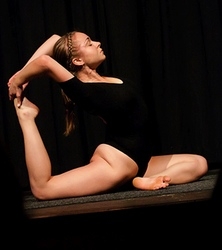
The rising popularity of hot yoga in the last decade has left some Washingtonians asking why anyone would want to exercise in a sauna. Others wonder whether it would be a safe option for them. Dr. Timothy McCall, the medical editor of Yoga Journal and author of Yoga as Medicine: The Yogic Prescription for Health and Healing, answers questions about the risks and benefits of hot yoga.
Is doing yoga in a room heated to near 100 degrees good for you?
I think that “good for you” is asking for a one-size-fits-all answer, and I don’t think there is one. For some people, it’s ill advised. It depends on the person’s fitness level, age, acclimation to heat, how much alcohol they drank the night before, and many other factors.
The answer is more nuanced. Bikram and hot yoga for the right student could be absolutely brilliant. But this kind of yoga isn’t for everyone.
Who should try hot yoga?
First of all, it’s a matter of taste. We have so many different choices when it comes to yoga. For someone who’s reasonably fit and looking for a good workout, it’s gonna be a good workout. People who should be careful include those with an inflammatory condition, certain blood conditions, or multiple sclerosis. Pregnant women should also be careful; you don’t want to get dehydrated when you’re pregnant.
How does the heat affect the yoga practice?
It’s probably gonna be a greater aerobic workout. It’s probably also true that muscles become more pliable. And in yoga we’re trying to stretch muscles, but we also know that sometimes we stretch them too far or we stretch a ligament. Ligaments are not meant to stretched. When you make it warmer, you are just a little more likely to stretch too far, but you’re also more likely to stretch to a better place.
What effect does all that sweating have on your body?
Sometimes it feels good, but whether that’s scientific, who knows?
Sweat is not a major remover of toxins from the body. That’s a claim you hear, but in studies they don’t find [toxins] coming out in the sweat. There’s an area of disagreement there, but the official medical opinion is that sweat is not a major remover of toxins.
See Also:
What are the potential risks of hot yoga?
In terms of the heat, the biggest risk is dehydration. Dehydration is reasonably easy to diagnose, prevent and treat, but if it’s left untreated, it’s very dangerous. In some classes, they actually encourage you not to drink water and that’s super bad news.
That’s the biggest risk; however, when you do the practice regularly, you become acclimated and it becomes not such a big issue at all. When you’re starting out is when you have to be the most careful.
The thing you should be most worried about is heat stroke. That is a potentially fatal condition—not that that’s going to be a common occurrence. Also, blood clots are more likely to occur when you’re dehydrated.
With that said, I’ve heard from people who were suffering from all kinds of things and taking a hot yoga class absolutely changed their lives, so there’s a lot of beauty here too.
How do you prevent dehydration?
Drinking water before, during, and after practice is my recommendation.
If you can take your pulse, that’s the fastest way to assess whether you’re dehydrated. When you rest, if it doesn’t go back down, that’s a sign that you may be dehydrated.
How do you avoid injury when practicing hot yoga?
A smart practitioner will listen to the feedback his or her body is giving. It’s when they force it that they get in trouble. If you’re smart, the heat can help you. If you’re the kind of person who pushes it, you may push too hard and are more likely to get injured.
How do you know if hot yoga is right for you?
The best thing is to talk to your physician and get some advice about whether this is a good thing to start. Often with yoga, we tell people to ease their way into it. Maybe do something else to get in good shape before you try it. Most of all, listen to your feedback. If you do the process and it makes you feel great, then it’s probably a great idea. If it doesn’t make you feel great, well, maybe it’s not for you.
I would emphasize that there are many different styles of yoga and there’s something for everybody. Bikram is a very popular option and it might be for you, but if it’s not, there are many other choices.

















